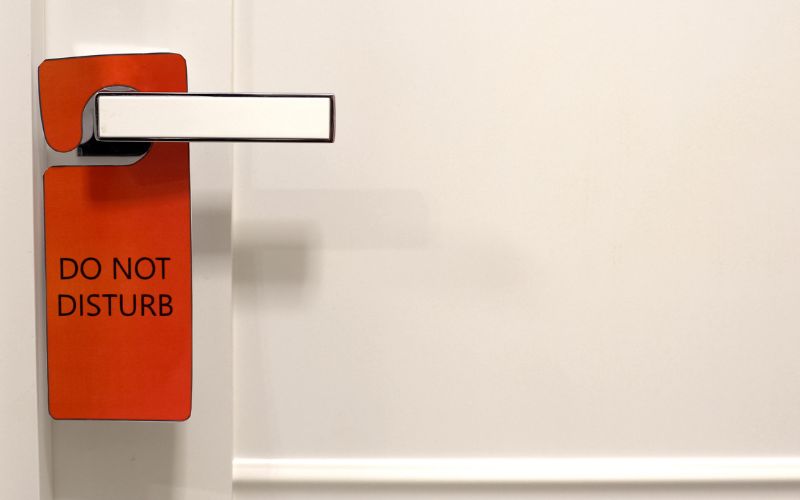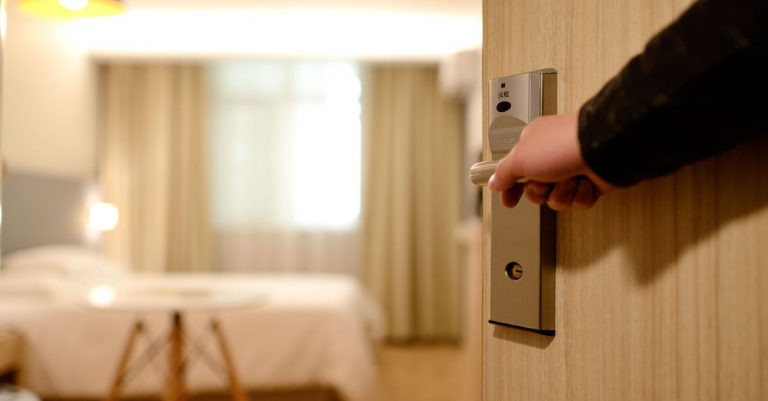If you need to contact someone staying at a hotel, your natural instinct may be to call the front desk and ask to speak with them or leave a message for them. But can you call a hotel and ask for a guest by name?
In most cases, yes, but hotels do aim to protect guest privacy and security.
In this article, we’ll look at hotel policies when a non-guest tries to call and request a guest by name. We’ll cover privacy protections, reasons calls may be denied, how messages are handled, and tips for reaching hotel guests by phone.
Balancing Guest Privacy and Accessibility

When calling a hotel to speak with a guest, finding the right balance between privacy and accessibility is crucial. Hotels have strict policies in place to protect the personal information of their guests while still ensuring that friends, family, or important contacts can reach them when necessary.
This article will explore how hotels maintain this delicate balance.
Policies Limit Personal Info Given Out
Hotels understand the importance of guest privacy and take measures to limit the personal information given out over the phone. When someone calls the hotel to connect with a guest, the staff will typically ask for the caller’s name and relationship with the guest.
This helps verify the caller’s identity and ensure they have a valid reason for contacting the guest. However, hotels will not disclose room numbers or other sensitive information that could compromise the guest’s privacy.
This policy helps to protect guests from unwanted calls or potential security risks.
Also Read: Can A Hotel Give Out Guest Information?
Guests Can Provide Contact Preferences
Guests can provide contact preferences when checking in to protect their privacy further. They can specify whether they want their information to be shared with callers or if they prefer to remain unlisted. This allows guests to control who can reach them during their stay.
Hotels respect these preferences and ensure they are followed when connecting calls to guests. Guests must communicate their contact preferences to the front desk when checking in to avoid any potential misunderstandings.
Staff Use Discretion When Transferring Calls
Hotel staff play a vital role in maintaining guest privacy while ensuring that important calls are connected. They exercise discretion when transferring calls, only sharing necessary information with the caller.
For example, if a guest has specified that they don’t want their room number disclosed, the staff will simply say they have a call for them without further details. This level of professionalism and respect for privacy is essential to hotel operations.
By balancing guest privacy and accessibility, hotels create a safe and secure environment. They prioritize protecting personal information while still allowing important calls to be connected.
So the next time you need to reach someone staying at a hotel, rest assured, knowing that their privacy is being respected.
Why Hotels May Not Connect or Take Messages
When you try to call a hotel to speak with a guest, you may sometimes find that they cannot connect you or take a message. There are several reasons behind this policy that hotels have in place.
Unable to Verify Caller Relationship
Hotels prioritize the privacy and security of their guests. They are responsible for protecting their guests’ personal information and ensuring their safety during their stay. Therefore, when someone calls to speak with a guest, the hotel may not verify the caller’s relationship with the guest.
This is especially important when protecting guests from potential scams or harassment.
Hotels often require callers to provide specific information, such as the guest’s full name, room number, or a pre-established code word, to verify their relationship with the guest. If the caller cannot provide this information, the hotel may decline to connect the call or take a message.
Guest Instructions Decline Outside Calls
Another reason hotels may not connect or take messages for guests is because some guests specifically request not to receive outside calls. This could be due to various reasons, such as wanting to maintain privacy, avoiding interruptions during their stay, or simply not being available to take calls.
Hotels respect their guests’ preferences and will adhere to their instructions. If a guest has requested not to receive outside calls, the hotel staff will politely inform callers that the guest is not available to take their call.
Do Not Disturb Requests

Hotels often provide the option for guests to use the “Do Not Disturb” feature, which allows guests to enjoy uninterrupted privacy and relaxation. When guests activate the “Do Not Disturb” feature, they do not wish to be disturbed by external communications, including phone calls.
When you call a hotel and the guest has activated the “Do Not Disturb” feature, the hotel staff will respect their request and not connect or take messages on their behalf. This ensures that the guest can enjoy their stay without any unwanted interruptions.
It’s important to remember that these policies are in place to protect the privacy and security of hotel guests. While it may be frustrating at times, it is ultimately for the benefit of the guests and their overall experience during their stay.
How Hotels Handle Phone Messages for Guests
Taking Down Caller Details
When someone calls a hotel to speak with a guest, the front desk staff follows a specific protocol to ensure the guest receives the message promptly. The staff member who answers the call politely asks for the caller’s name, contact information, and the purpose of the call.
This information is crucial for accurately relaying the message to the guest. Hotels prioritize guest privacy and ensure caller details are handled with the utmost confidentiality.
Delivering Message at Check-In/Out
Once the front desk staff has taken down the caller’s details, they deliver the message to the guest at an appropriate time. One common practice is informing the guest about the message during check-in or check-out.
This ensures that the guest is aware of any important calls or inquiries. It also allows the staff to provide any necessary assistance or guidance related to the message. Hotels strive to create a seamless customer communication experience, ensuring important messages are received immediately.
Discreetly Slipping Note Under Door
In cases where the guest is unavailable or prefers not to be disturbed, hotels have a discreet method of delivering messages. The front desk staff may slip a note under the guest’s door, informing them about the call and providing the necessary details.
This method allows guests to receive their messages without any interruption or inconvenience. Hotels understand the importance of respecting their guests’ privacy and strive to find the most suitable way to ensure effective communication.
For more information on hotel policies and guest privacy, visit www.hotelnewsresource.com, a reputable source for news and insights in the hospitality industry.
Tips for Reaching Hotel Guests You Know

When you need to get in touch with someone staying at a hotel, it can sometimes be challenging to reach them. However, following a few simple tips can increase your chances of successfully connecting with the guest you know.
Verify Room Number Before Calling
Before picking up the phone, it’s important to verify the room number of the guest you wish to contact. This ensures you call the correct room and avoids potential embarrassment or inconvenience.
You can call the hotel’s front desk and provide them with the guest’s name to obtain the accurate room number. Alternatively, some hotels offer online directories where you can find the room number of a specific guest.
Mention Mutual Connections
If you have mutual connections with the guest, it can be helpful to mention this when calling the hotel. This establishes a sense of familiarity and increases the likelihood of the call being sent to the guest’s room.
For example, if you both attended the same conference or have a common colleague, mentioning these connections can make the hotel staff more willing to assist you in reaching the guest.
Arrange Call Ahead if Privacy Concerns
If you have concerns about privacy or the guest’s availability, it is best to arrange the call beforehand. This lets the hotel staff inform the guest about your intended call and ensures they are prepared to receive it.
By planning ahead, you can avoid any potential interruptions or inconveniences for the guest.
Remember, it is important to respect the hotel’s policies and the guest’s privacy when attempting to reach someone staying at a hotel. Following these tips will help increase your chances of successfully connecting with the guest you know.
Conclusion
Hotels try to facilitate connecting genuine callers with guests while protecting privacy. You can coordinate calls with hotel friends or family through preparation and transparent communication.






